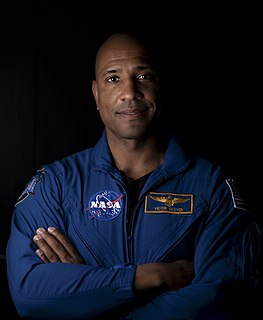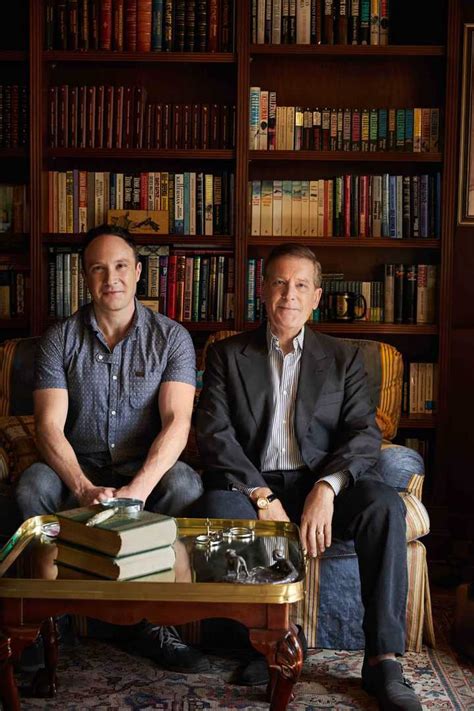Ein Zitat von John Glenn
Denn wissen Sie, es wird noch einige Jahre dauern, bis wir unsere eigenen neuen Trägerraketen und neuen Raumschiffe haben, die zu unserer eigenen Internationalen Raumstation fliegen und mit all der Forschung fortfahren können, für die wir dort 100 Milliarden US-Dollar ausgegeben haben diese Forschungsfähigkeit für die Zukunft der Menschen hier auf der Erde.
Verwandte Zitate
Mir gefällt nicht, wie sich das Ganze entwickelt hat. Und ich hoffe nur, dass wir so schnell wie möglich unser eigenes Transportsystem entwickeln, sowohl Raumfahrzeuge als auch neue Trägerraketen. Ich hasse den Gedanken, dass wir in sieben bis zehn Jahren dort draußen sein könnten und bei unserer Reise ins All auf die Russen angewiesen sein könnten.
Für die meisten von uns kommt der Gedanke, in eine andere Galaxie zu reisen, wahrscheinlich wie Science-Fiction vor. Aber die Wahrheit ist, dass der Grundstein für die Reise der Menschheit über das Sonnensystem der Erde hinaus gerade jetzt an Bord unserer eigenen Internationalen Raumstation gelegt wird.
Bei der Erkundung geht es natürlich darum, neue Orte zu erkunden, aber ich glaube nicht, dass wir an neue Orte gehen, nur um zu sagen: „Na ja, wir waren schon da“ und zurückzukommen, so interessant es auch sein mag. Meiner Meinung nach sollten wir jedes Mal, wenn wir weiter in den Weltraum vordringen, dies für Grundlagenforschung nutzen – Grundlagenforschung, die nicht durchgeführt werden kann, bevor man dort ist.
Wenn das Alter der Erde ein Kalenderjahr wäre und der heutige Tag einen Atemzug vor Mitternacht am Silvesterabend wäre, wären wir erst vor knapp einer Viertelstunde aufgetaucht, und die gesamte aufgezeichnete Geschichte ist in den letzten sechzig Sekunden wie im Flug vergangen. Zum Glück haben unsere Planetengefährten – das fantastische Geflecht aus Pflanzen, Tieren und Mikroben – seit März, unglaubliche 3,8 Milliarden Jahre seit der Entstehung der ersten Bakterien, geduldig ihre Produkte perfektioniert. ...Nach 3,8 Milliarden Jahren Forschung und Entwicklung sind Misserfolge Fossilien, und was uns umgibt, ist das Geheimnis des Überlebens.
Ich erinnere mich an das erste Mal, als ich als Ranger alleine am Inspiration Point an der Canyon Station stand und auf dieses wunderschöne Land blickte. Ich dachte bei mir, was für ein Glück ich hatte, dass die Generation meiner Eltern und Großeltern die Vision und die Entschlossenheit hatte, es für uns zu retten. Jetzt sind wir an der Reihe, unser eigenes Geschenk direkt an diejenigen zu machen, die in 15 Jahren, 40 Jahren, 100 Jahren nach uns kommen werden. Ich möchte der Generation meiner Enkel genauso treu sein wie Old Faithful unserer Generation. Wie könnten wir unserem dritten Jahrhundert der Freiheit besser eine neue Dimension verleihen?
In Amerika haben wir keine Möglichkeit, zu unserer eigenen Raumstation zu gelangen. Wir müssen die Russen dafür bezahlen, dass sie unsere Leute dort oben unterbringen, um sie in den Weltraum zu schicken – sich mit der Raumstation zu treffen und sie am Ende ihres Aufenthalts zurückzubringen, und das ist für mich einfach falsch. Wir sollen die größte Raumfahrtnation der Welt sein, und es hielt ich für einen Fehler, unsere eigenen Transportmöglichkeiten zu streichen, auch wenn das einiges an Geld sparen würde.
Wir sind irgendwie die Kinder des Planeten, wir sind irgendwie seine schönste Stunde; wir binden die Zeit, wir binden die Vergangenheit, wir antizipieren die Zukunft – wir gehen hyperräumlich vor; Wir beanspruchen eine völlig neue Dimension für die Biologie, die sie noch nie zuvor beansprucht hat. Wir werden tatsächlich zu einer Art Wesen der vierten Dimension. Unsere Zukunft liegt irgendwie bei uns, da wir scheinbar in der Lage sind, durch Metamorphose in unsere eigenen Vorstellungen zu gelangen – eine Superzivilisation, die sich über Raum und Zeit ausbreitet. Unsere Zukunft ist ein Geheimnis, unser Schicksal besteht darin, in der Fantasie zu leben.
Ich glaube, wir haben diese Fähigkeiten. Das bedeutet nicht, dass wir sie nutzen werden. Unsere Zukunft ist hier nicht gesichert. Es ist nicht klar, ob wir unsere eigene Torheit überleben werden, aber wir haben die seltene Gelegenheit dazu, wenn wir zuhören und die Botschaften erkennen, die uns die Natur gerade zeigt, die Endlichkeit unserer eigenen Ressourcen und unseres eigenen Planeten im Augenblick.
Was Russland betrifft, so sind sie schon seit langem, seit Anfang der 90er Jahre, unser Partner. Wissen Sie, was ist das? Das sind mehr als 15 Jahre. Und es gab Zeiten, in denen die Dinge etwas angespannt und etwas heikel waren, aber im Großen und Ganzen war die Partnerschaft sehr erfolgreich. Um Ihnen zwei Beispiele zu nennen: Als sich der Columbia-Unfall ereignete, unterstützten uns die Russen mit ihren Raumschiffen, die unsere Astronauten, mich eingeschlossen, zur Raumstation brachten und auch Vorräte lieferten.
Eines der Dinge, und das Aufregendste, eigentlich definitiv das Aufregendste, ist, Kinder zu haben. Wissen Sie, ich hatte vorher keine Kinder. Ich war erst ein Jahr vor meiner Raumstationsmission verheiratet, daher ist es eine ganz neue Erfahrung und das neue Abenteuer, drei Jahre alt zu sein. Es mag komisch klingen, weil Menschen jeden Tag Kinder haben, aber eigene Kinder zu haben, meine eigenen Kinder zu haben, hat das Leben genauso grundlegend oder vielleicht sogar noch grundlegender verändert als sogar das Fliegen im Weltraum.
Obwohl ich wusste, dass ich mich im Space Shuttle befand und mich auf den Flug vorbereitete, war irgendetwas daran nicht ganz real, bis wir ungefähr eine Minute vor dem Abflug den Anruf erhielten, unsere Visiere zu schließen und zu verriegeln und mit der Sauerstoffzufuhr zu beginnen. Ich werde oft gefragt: „Wie hat es sich direkt beim Start angefühlt?“ Und sie sind überrascht, wenn ich ihnen tatsächlich erzähle, was ich als Erleichterung empfand. Es war nicht so, als ob ich ängstlich oder verängstigt wäre oder so etwas. Es war eine Erleichterung, denn das ist etwas, was ich mein ganzes Leben lang tun wollte, und jetzt, da die Booster gezündet hatten, machten wir uns auf den Weg, es zu tun, und nichts konnte uns aufhalten.
In jedem Bereich unseres Lebens, in dem wir es versäumen, aus Integrität zu handeln oder unser eigenes Verständnis davon zu verletzen, was für uns richtig oder falsch ist, geraten wir dazu, die Bedürfnisse der Außenwelt über unsere eigenen zu stellen. Wir trennen uns dann von der Ungeheuerlichkeit unserer Macht und unserer Fähigkeit, das zu erschaffen, was wir wollen.
Ich habe noch nie ein System oder ein Programm gehabt, ich denke immer, dass ich nicht weiß, wie ich mich verhalten soll. Ich werde mich an jeden Regisseur anpassen, weil ich nicht wirklich eine feste Art und Weise habe, wie ich Dinge mache. Wenn ein Regisseur mich anheuert und sagt: „Ich möchte, dass Sie sofort anfangen und diese Recherche, diese Recherche, diese Recherche durchführen und ich möchte, dass Sie sich jede Zeile merken, bevor Sie überhaupt zum ersten Tag auftauchen“, dann ist das so Ich werde tun.


























